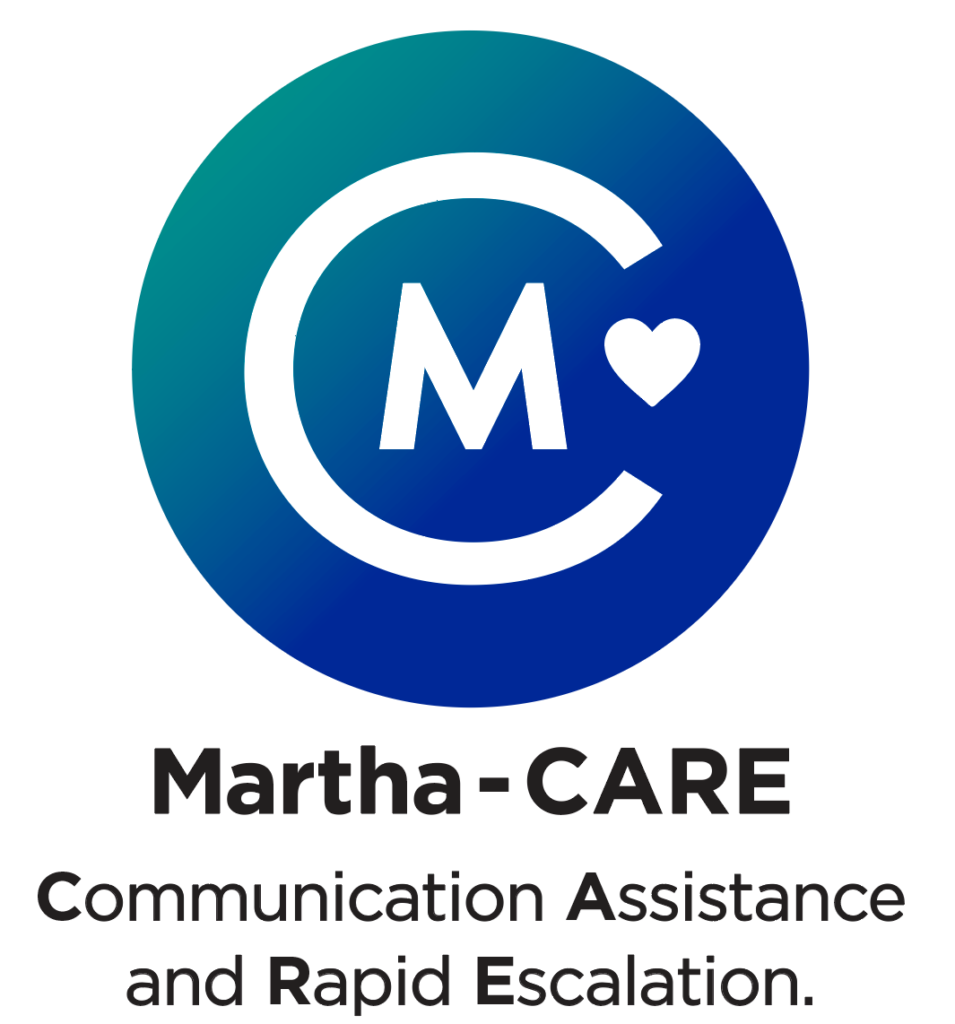- Home
- For Professionals
- Martha's Rule

Martha's Rule
What is Martha's Rule?
The tragic death of thirteen year old Martha Mills in the UK has driven her parents to advocate for a systematic change in how urgent reviews are sought by families if their loved one’s condition deteriorates and they are concerned this is not being responded to.
Martha’s Rule is a commitment from Secretary of State for Health and Social Care and NHS England to ensure the vitally important concerns of the patient and those who know the patient best are listened to and acted upon.
What does it involve?
The 3 components of Martha’s Rule are as follows
- Patients will be asked, at least daily, about how they are feeling, and if they are getting better or worse, and this information will be acted on in a structured way.
- All staff will be able, at any time, to ask for a review from a different team if they are concerned that a patient is deteriorating, and they are not being responded to.
- This escalation route will also always be available to patients themselves, their families and carers and advertised across the hospital.
In May 2024 NHS England announced the implementation of Phase 1 of Martha’s Rule across 143 pilot sites across the country, focusing on supporting participating provider sites to devise and agree a standardised approach to all 3 elements of Martha’s Rule. In May 2025 Phase 2 was launched to include other adult sites, as well as Maternity and Neonates.
Three Paediatric Critical Care Operational Delivery Networks (PCC ODNs) are now testing delivery models for Martha’s Rule in paediatrics; West Midlands, Yorkshire and Humber and North Thames. These pilots are playing a pivotal role in shaping the design and development of the programme, with a specific focus on the escalation of concerns regarding deterioration in children.
The new National PEWS will also support obtaining information from families and carers in a structured way, with the recording of parental concern alongside regular clinical observations.
The support offer from NHS England will include additional funding for project resources, and access to specialist implementation support and expertise from the Health Innovation Network’s Patient Safety Collaboratives.
- Martha-CARE: Communication Assistance and Rapid Escalation
Martha-CARE is the North Thames pilot project launched in May 2025 forming part of the NHS England response to Martha’s Rule, focusing on paediatrics. At its heart it is a family, carer or staff led escalation procedure to elicit assistance with clinical deterioration or communication concerns. The team is formed of paediatric and critical care consultants, as well as critical care family liaison nurses.
Martha-CARE will compliment and enhance local hospital escalation procedures, and is based around an existing network wide paediatric expert critical care multi-disciplinary outreach team, the Children’s Acute Transport Service (CATS). If a member of staff or a parent/family member or carer continues to have concerns about their child’s condition following the local escalation pathway within their Trust then they can escalate this externally to the Martha-CARE team. In addition, the Martha-CARE line will provide support with acute communication needs in clinical situations, such as complex care decisions and liaison with specialist teams. The phone number is available 24/7.
The team will also be providing bespoke education and upskilling to trusts to facilitate the implementation of Martha’s Rule in paediatrics, with a focus on how smaller hospitals or those without a Paediatric Critical Care Outreach service would provide the requested response. This also involves providing training around advanced communication skills in partnership with the Medical Mediation Foundation, and clinical skills workshops.
Meet the Team

Dr Craig Knott
Martha's Rule Clinical Lead
About
Craig is a Paediatric Intensive Care consultant at Royal London Hospital in East London. He completed his training in paediatrics and paediatric intensive care Medicine in North London and Toronto, Canada, and was previously a locum consultant at the Children’s Acute Transport Service.His work interests are multi professional education and training, patient safety and human factors, and paediatric major trauma.
Craig applied for the Martha’s rule post because he is passionate about every child and every family getting the best care that the NHS can deliver, and the importance of family-centred care in this with family members working as part of the clinical team and being empowered to contribute to the team plans. He has a deep interest in the role that human factors, and interpersonal dynamics have in influencing health professional behaviours. He feels Martha’s rule straddles both these interests and offers an opportunity for family to drive healthcare improvement. Working in East London, he is very aware of the impact of barriers, whether from language, health literacy, or complex social circumstances, that impair access to improvements such as Martha’s rule, and wants to work to ensure that there is equity in the application of the Martha’s rule programme. This is his first post with the North Thames Paediatric Network, and he is looking forward to working with a passionate and dedicated team drawn from across the North Thames region.

Dr Beatrice Allnutt
Martha's Rule Clinical Lead
About
Beatrice is an acute general paediatrician with over 15 years’ experience in emergency medicine, critical care, neonates and general paediatrics. She completed her primary medical qualification at Wits University in South Africa and worked for 3 years as a junior resident there. She completed paediatric training with a SPIN in High Dependency Care in North Thames. She is currently a consultant at Northwick Park Hospital, London North West University Healthcare NHS Trust, where she balances her time between the emergency department and general paediatric clinics. She is the Lead for the Paediatric High Dependency Unit at the trust, a brand new service she developed and successfully delivered in 2023.

Dr Janani Pallawela
Martha's Rule Clinical Lead
About
I have been a Consultant General Paediatrician at North Middlesex since 2013. I have an interest in HDU and worked in London PICUs during my training.

Dr Javier Gavela
Martha's Rule Clinical Lead
About
Javier is a consultant in paediatric cardiac intensive care medicine at Great Ormond Street Hospital. He previously trained in Madrid where he specialised in paediatrics and intensive care before coming to London 9 years ago. At Great Ormond Street Hospital, he completed several PICU fellowships and furthered his previous training in cardiology, obtaining european accreditation in echocardiography. He is currently the Infection Control and Resuscitation lead in his department and has a strong interest in research in functional echocardiography, education and simulation. He is also very passionate about quality improvement projects aimed at improving patient experience.

Amy Hunter
Lead Nurse Educator, Lead for Risk & Governance and Interim Lead Nurse PiC
About
With 10 years of paediatric nursing experience, Amy has a particular interest in emergency, high dependency, and intensive care nursing. She has worked in Accident and Emergency, Paediatric Intensive Care (PICU) and for the Children’s Acute Transport service (CATS). Amy has delivered education on a day-to-day basis, as part of her senior nursing role. Amy is a visiting lecturer at London South Bank University (LSBU). She is very passionate about education and enthusiastic to make it equal and accessible to all within the NTPN.

Annie Bruce
Patient and Family Support Nurse - Martha's Rule Pilot
About
Annie is a senior Paediatric Intensive Care nurse with over 14 years of experience looking after children requiring Level 2, 3 and 4 critical care with varying conditions including cardiac, respiratory, renal and neurology. Annie worked as a retrieval nurse with the South Thames Retrieval Service (STRS) and has delivered education to various teams on the management of deteriorating children, as well as regular paediatric resuscitation training. She is passionate about ensuring high quality care and the family experience within healthcare, and has a particular interest in psychology and counselling.

Anne Dowson
Patient and Family Support Nurse - Martha's Rule Pilot
About
Anne has over 20 years experience in paediatric nursing with expertise in Paediatric Intensive Care (PIC). Her experience includes working for the Children’s Acute Transport Service (CATS), serving as a PIC clinical nurse educator and conducting research in simulation training. Most recently Anne has supported children and their families across paediatric services within a tertiary centre whilst in a family liaison role. In April 2025 Anne joined the Network as part of the Martha’s Rule Team. She is dedicated to promoting the engagement of families in their child’s care whilst also empowering healthcare staff through education and support.

Kylie Lyons
Patient and Family Support Nurse - Martha's Rule Pilot
About
I have worked in paediatric critical care for over 10 years at the RLH specialising in the care of critically ill children requiring either level 2 or level 3 care. In this role I was one of the senior sisters responsible for managing a team of nurses meeting both their clinical and educational needs. For the past 4 years I have worked as a rotational transport nurse specialist for the CATs team caring for critically ill children across the network.
What's yet to be worked out?
The extended pilot phase of the national project, as well as the local Paediatric Critical Care ODN pilots, will be integral in identifying and establishing the necessary governance, infrastructure, education and finance required for successful implementation with children and young people in acute care. The three pilot site are providing different models of support to understand what is most beneficial to paediatric services.
The Paediatric Critical Care Society & CYP Teams remain integral to national level discussions and shaping any subsequent decisions surrounding implementation within paediatric services in the UK.
How to contact us
Resources
Martha-CARE Communication Referral Form

